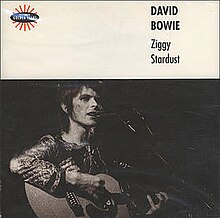| "Ziggy Stardust" | |
|---|---|
 Cover of the 1994 live single version | |
| Song by David Bowie | |
| from the album The Rise and Fall of Ziggy Stardust and the Spiders from Mars | |
| Released | 16 June 1972 |
| Recorded | 11 November 1971 |
| Studio | Trident, London |
| Genre | Glam rock |
| Length | 3:13 |
| Label | RCA |
| Songwriter(s) | David Bowie |
| Producer(s) |
|
| Music video | |
| "Ziggy Stardust" on YouTube | |
"Ziggy Stardust" is a song by the English singer-songwriter David Bowie from his 1972 album The Rise and Fall of Ziggy Stardust and the Spiders from Mars. Co-produced by Bowie and Ken Scott, he recorded it at Trident Studios in London in November 1971 with his backing band the Spiders from Mars—comprising Mick Ronson, Trevor Bolder and Mick Woodmansey. Lyrically, the song is about Ziggy Stardust, a bisexual alien rock star who acts as a messenger for extraterrestrial beings. The character was influenced by English singer Vince Taylor, as well as the Legendary Stardust Cowboy and Kansai Yamamoto. Although Ziggy is introduced earlier on the album, this song is its centrepiece, presenting the rise and fall of the star in a very human-like manner. Musically, it is a glam rock song, like its parent album, and is based around a Ronson guitar riff.
Since its release, "Ziggy Stardust" has received widespread acclaim from music critics, with the majority praising its story, guitar riff and the band's performance. The song has since been included on lists of Bowie's greatest songs, and by some as one of the greatest songs of all time. Rolling Stone ranked it number 282 on their list of The 500 Greatest Songs of All Time in 2010. The track is also one of four of Bowie's songs included in The Rock and Roll Hall of Fame's 500 Songs that Shaped Rock and Roll. Bowie performed the song frequently on the Ziggy Stardust and 1978 Stage tours, and again during his tours in the 2000s.
The song was covered by the English gothic rock band Bauhaus in 1982; their version peaked at number 15 on the UK Singles Chart. While Bowie's original recording was never released as a single, a live version from 1972 was released as a single in France in 1994 to promote the bootleg album Santa Monica '72. The song has since appeared on multiple compilation albums and has been remastered several times, including in 2012 for its 40th anniversary; this remaster was included in the box set Five Years (1969–1973) in 2015.